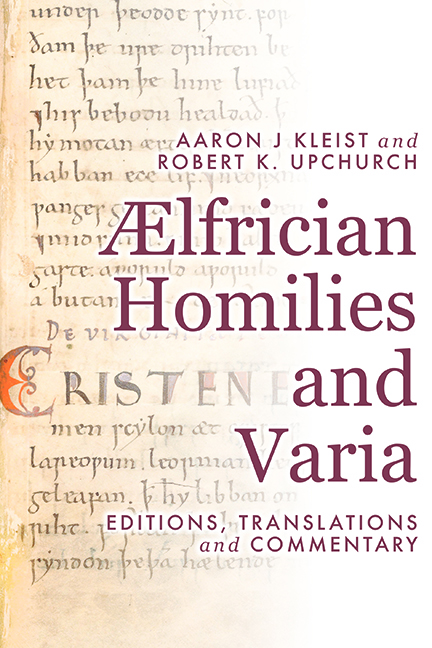Book contents
- Frontmatter
- Contents
- Preface
- Acknowledgements
- Abbreviations
- Sigla for Cited Ælfrician Manuscripts
- Dates for Cited Ælfrician Works
- Editorial Conventions
- Conventions Used in the Commentaries
- Homilies The Proper of the Season
- Homilies The Proper of the Saints
- Ælfrician Homilies and Varia: Editions, Translations, and Commentary: Volume II
- Homilies The Common of the Saints
- Homilies Unspecified Occasions
- Varia
- Works Cited
- Index
- ANGLO-SAXON TEXTS
20 - Læwedum Mannum Is to Witenne (‘The Laity Are to Know’)
Published online by Cambridge University Press: 05 March 2024
- Frontmatter
- Contents
- Preface
- Acknowledgements
- Abbreviations
- Sigla for Cited Ælfrician Manuscripts
- Dates for Cited Ælfrician Works
- Editorial Conventions
- Conventions Used in the Commentaries
- Homilies The Proper of the Season
- Homilies The Proper of the Saints
- Ælfrician Homilies and Varia: Editions, Translations, and Commentary: Volume II
- Homilies The Common of the Saints
- Homilies Unspecified Occasions
- Varia
- Works Cited
- Index
- ANGLO-SAXON TEXTS
Summary
Læwedum Mannum Is to Witenne (‘The Laity Are to Know’), a brief exhortation to laypeople about chastity, fasting, and sobriety, appears as the final item in a series of fifteen texts suitable for use by catechists and confessors that Ælfric composed in 992 and then appended to Cambridge University Library, Gg. 3. 28 [K]. The exhortation follows De penitentia (AH II.19) and like that treatise would have been appropriate for use during Lent, though Ælfric's advice applies as well to ‘holy times’ (halgum timum) and Ember fasts as well [lines 1–2]. Ember Days were days of fasting, abstinence, and prayer observed about every three months on the Wednesday, Friday, and Saturday of a given week, while halgum timum may refer to Sundays and feast-days like those commemorated in the Catholic Homilies. Exhortations similar to those in Læwedum Mannum regarding Lenten chastity and fasting, and the tithing of one's body and goods [lines 2–6] may be found in Ælfric's sermons for the First Sunday in Lent (CH I.11 and CH II.7). And though he also warns against drunkenness in other Lenten sermons, only here does he single out the sin's potential to negate one's fast altogether [lines 6–7]. In the final sentence of Læwedum Mannum, admonition gives way to benediction as the rare second-person blessing conveys the exhortation's catechetical thrust. There a speaker, presumably a priest whose purview it was to offer a benediction, turns from teaching the laity what is expected of them and blesses their efforts to meet those expectations: ‘Se Scyppend þe eow gesceop sylle eow godne willan and eow gelæde to ðam ecan life’ (‘“May the Creator who created you give you good will and lead you to the everlasting life”’ [lines 7–8]).
We cannot say for certain what context Ælfric had in mind for this interaction. Lent figures prominently in the exhortation, and its contents are appropriate to the catechesis of the season. The Paternoster, creeds, prayers, and penitential treatise that precede Læwedum Mannum in K are also suited to the season, and Ælfric encourages Christians to go to confession during the first two weeks of Lent. As the plural form of the address in the benediction may suggest, perhaps he had in mind moments when priests would instruct the laity in groups.
- Type
- Chapter
- Information
- Ælfrician Homilies and VariaEditions, Translations, and Commentary, pp. 899 - 908Publisher: Boydell & BrewerPrint publication year: 2022

